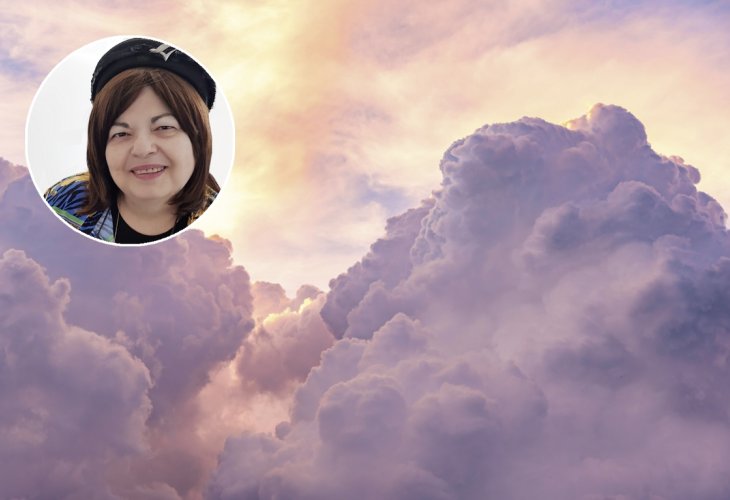For the Woman
From Trauma to Teshuvah: The Extraordinary Life Journey of Esther Shefer
How a childhood accident, personal loss, and inner strength led her to healing, faith, and a life dedicated to helping others
 (In circle: Esther Sheffer)
(In circle: Esther Sheffer)Most people begin their spiritual journey as adults or teenagers. Rarely does a story of returning to Judaism begin at the age of nine and a half. But for Esther Shefer — now a respected emotional and body-mind therapist, wife of the Chief Rabbi of Romania, and mother and grandmother — her path back to Torah began with a single, life-altering moment in childhood.
Born into a completely secular home, she never imagined her life would be shaped by miracles, tragedy, and unwavering determination.
The Day Everything Changed
“I was a cheerful child,” Esther recalls. “Life always smiled at me.”
But during the euphoric days following the Six-Day War, her world suddenly cracked open.
She and her mother visited an aunt in Hadassah Hospital in Tel Aviv. Dressed proudly in her brand-new Shavuot dress and white shoes, Esther couldn’t know she would return to the hospital that same day — this time as a patient.
Rushing to share the joyful surprise that her brother had unexpectedly returned from the front, Esther dashed across a busy street.
“One woman made it. I didn’t,” she says. A bus hit her just a meter from the curb.
Months Between Life and Death
The next memories remain carved into her mind.
“Doctors cut off my beautiful dress, I was unconscious, and my condition was critical.” Part of her leg had been severed in the accident; her white shoe was later returned to her as a painful symbol of innocence lost.
For months she hovered between life and death. She weighed only 20 kilos, survived on IV fluids, underwent multiple surgeries and skin grafts, and became the “baby of the ward,” surrounded by wounded soldiers from the war.
But a turning point arrived in the most unexpected way: a renowned rabbi gave her mother a special medicinal jam.
“After one taste, my condition changed overnight,” Esther says.
“I stood up. I wanted to walk again. I refused to become a pity case.” Her fierce willpower became her hallmark.
A Young Woman Carrying the World Alone
Recovery didn’t mean an easy life. Her leg was damaged, she endured teasing and exclusion, and physical activities were often impossible. But she refused to surrender.
At 18, she enrolled in nursing school, longing to help the sick after years of medical trauma. At the same time her father’s health deteriorated dramatically. One evening he collapsed in her arms.
The phone line was busy. Neighbors helped her call an ambulance.
“It was too late,” Esther says softly.
Suddenly, she and her mother were left with no income. At a young age she became the breadwinner, rising quickly from a clerk to head of a securities department.
But more loss waited ahead. Her mother spiraled into depression, was later diagnosed with Alzheimer’s, and passed away when Esther was only 23. Two parents gone. No siblings at home. No emotional support.
“I filled every hour with work and study,” she says. “I slept with the radio on so I wouldn’t feel alone.”
A Heart Whispers to Heaven
“Sometimes I walked through the streets whispering, ‘If there is a God, please reveal Yourself to me.’” She wasn’t yet religious — but something in her soul was reaching out.
A turning point came through a chance friendship with a young woman who was beginning to embrace Torah. Their philosophical debates became long, deep, and transformative.
“She showed me how much I didn’t know,” Esther says. “Our conversations awakened something inside me.”
The two began attending Torah classes from well-known kiruv rabbis in Holon and later discovered the “Na’aseh VeNishma” program in Tel Aviv.
Day by day, her heart opened. Eventually, they agreed to attend a kiruv seminar — even though her friend couldn’t afford it.
“I said, ‘I’ll lend you the money. Just come.’” The seminar changed both of their lives.
Choosing Torah, Choosing Life
Esther began immersive study at the Seminary for Jewish Studies, after convincing the staff she was serious and ready. She learned Torah passionately, rebuilt her inner world, and soon met her future husband.
Together they built a warm, vibrant Torah home filled with purpose, giving, and spiritual growth.
Today she works as a body-mind therapist, helping others release emotional and energetic blocks — work shaped by her own lifelong journey of pain, resilience, and healing.
The Hidden Guidance of Heaven
Looking back, Esther sees a Divine pattern woven through her story.
“Teshuvah didn’t happen overnight. My entire life prepared me for it.
My disability protected me from paths that might have led me far from Hashem. And at every step, God sent me exactly the right people to guide and support me.”
Most of those women, she noticed later, were named Rachel.
“So I named my daughter Rachel,” she says with a smile. “In honor of all the ‘Rachels’ who helped me find my way home.”

